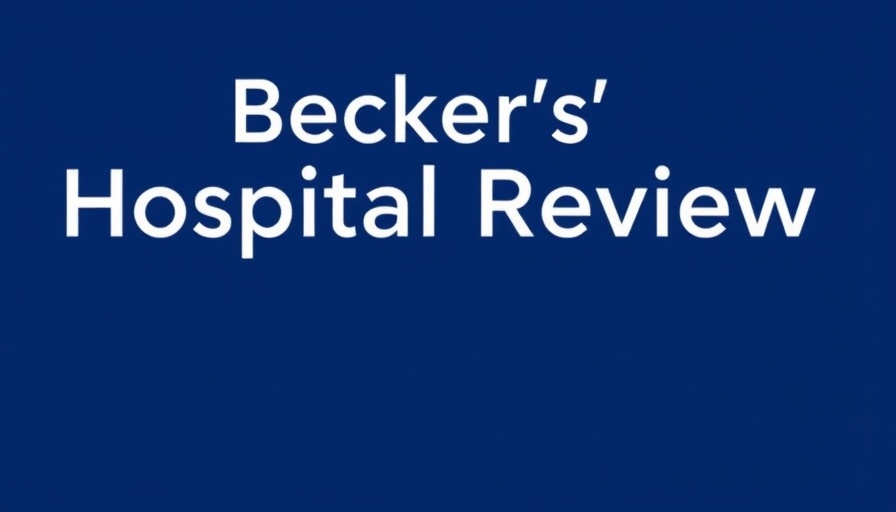
New Leadership for Lower Umpqua Hospital District
In an exciting development for healthcare in Oregon, Lower Umpqua Hospital District has appointed William Van Noy as its new Chief Financial Officer (CFO). Located in Reedsport, Oregon, this critical access hospital comprises a Level IV trauma center and three clinics. Van Noy's prior experience includes serving as the CFO for Magnolia Regional Medical Center in Arkansas, where he successfully managed the hospital's financial strategies during challenging times.
The Role of CFO in Healthcare
As CFO, Van Noy will not only oversee financial operations but also play a key role in improving service delivery and enhancing patient care. His expertise is particularly timely, as rural healthcare facilities like Lower Umpqua face unique challenges, including fluctuating financial support, reimbursement pressures, and the need for operational efficiency. This role is vital in ensuring that rural providers like Lower Umpqua can continue to serve their communities effectively, particularly as they navigate Medicare reimbursement processes and ongoing healthcare reforms.
Impact on Independent Providers and Community Health
The appointment of a new CFO can ripple through the entire healthcare community, especially among independent physicians and nurse practitioners. With the increasing focus on operational efficiency and sustainability in healthcare, providers are looking for solutions to optimize their practice revenue. This aligns well with the recent trends of practice automation and the implementation of patient engagement tools that aid in better managing patient interactions while maintaining a focus on value-based care. In particular, healthcare automation, including tools for medical billing recovery, offers significant promise in addressing insurance underpayments and improving financial health for practices.
Addressing Challenges in Rural Healthcare
Rural healthcare often faces financial hurdles that can impact patient access and quality of care. With Van Noy’s leadership, Lower Umpqua can enhance its strategies for addressing these challenges. Innovations like remote therapeutic monitoring (RTM) programs not only expand service offerings but also help in patient monitoring that is crucial in aging populations. This capability can aid in creating senior care solutions that enable patients to age in place with the necessary medical support. Such forward-thinking initiatives will resonate with family practice doctors and urgent care clinic directors who share the goal of sustaining patient wellness in underserved communities.
Expectations from the New CFO
The healthcare landscape is incredibly dynamic, and stakeholders expect Van Noy to lead strategic initiatives that bolster Lower Umpqua's mission to provide exceptional healthcare services. His past experiences must inform his approach towards enhancing employee health benefits and developing a culture that prioritizes staff retention and engagement. As more rural healthcare entities look for ways to navigate financial pressures, strong leadership will be essential, with a strong focus on leveraging healthcare business tools to drive efficiency and optimize clinic cost savings.
Encouraging a Holistic Approach to Healthcare
It is also crucial for healthcare leaders to encourage an integrated approach that takes into account both clinical effectiveness and financial sustainability. As the sector evolves with advancements in telehealth revenue generation and healthcare compliance, CFOs like Van Noy are positioned to facilitate meaningful dialogue about healthcare innovation. This innovation is necessary not just to thrive but to survive in a landscape marked by rapid change, particularly in the context of Medicare-backed services.
Conclusion: Fostering Connections in Healthcare
The appointment of William Van Noy as CFO is an encouraging sign for the Lower Umpqua Hospital District and its surrounding community. His leadership promises to enhance financial sustainability while maintaining a commitment to quality patient care. As healthcare providers, including independent pharmacies and small practices, continue to seek tools and strategies that promote growth and efficiency, the evolving role of the CFO will be critical in shaping the future of healthcare delivery.
For readers involved in healthcare or interested in the evolution of health businesses, following developments like these is essential. Understanding the implications of leadership changes can provide valuable insights into how healthcare organizations plan for future challenges. For continuous updates on such impactful developments, consider subscribing to our newsletter, where we share the latest in healthcare trends and best practices.
 Add Row
Add Row  Add
Add 




Write A Comment